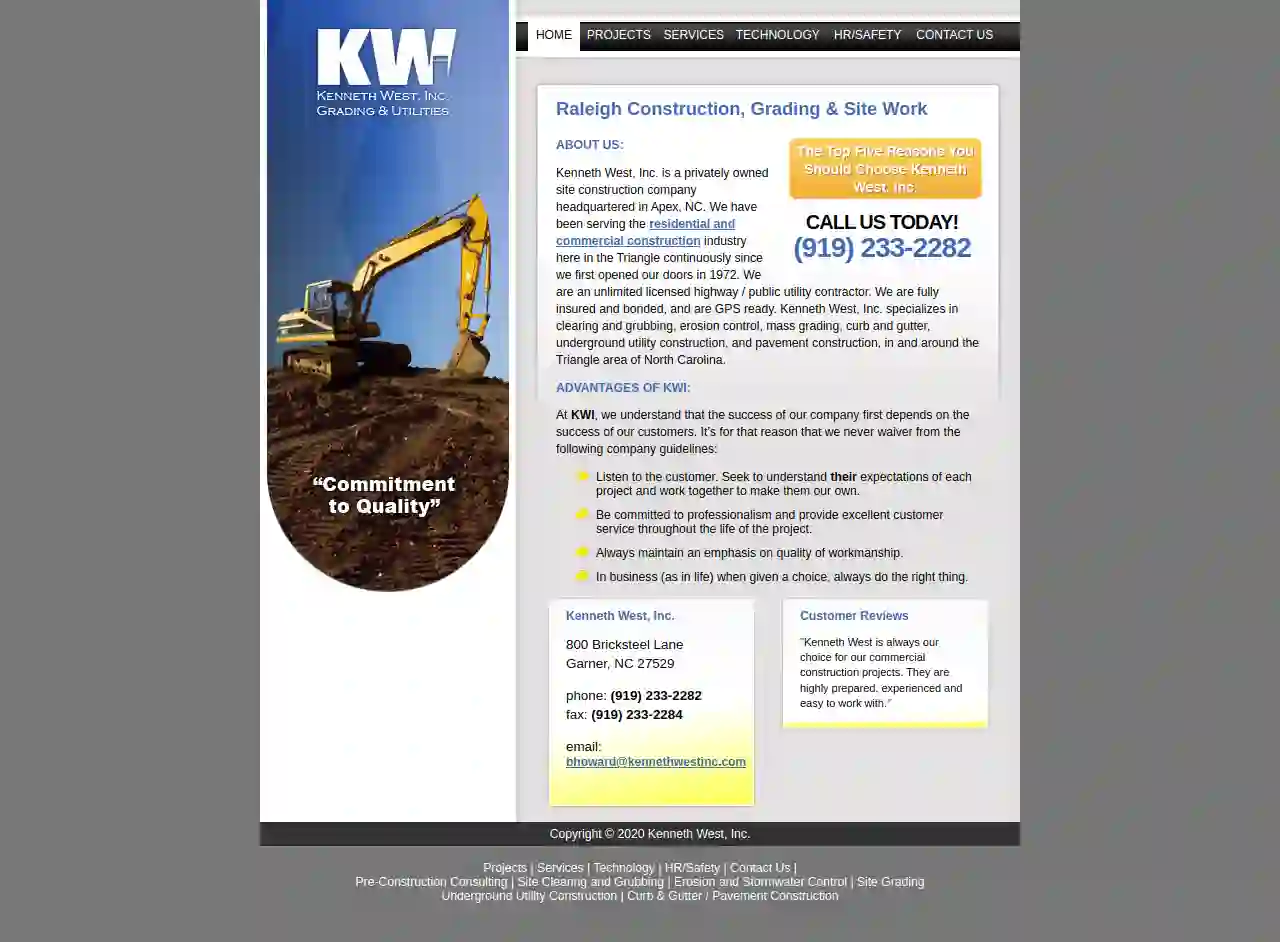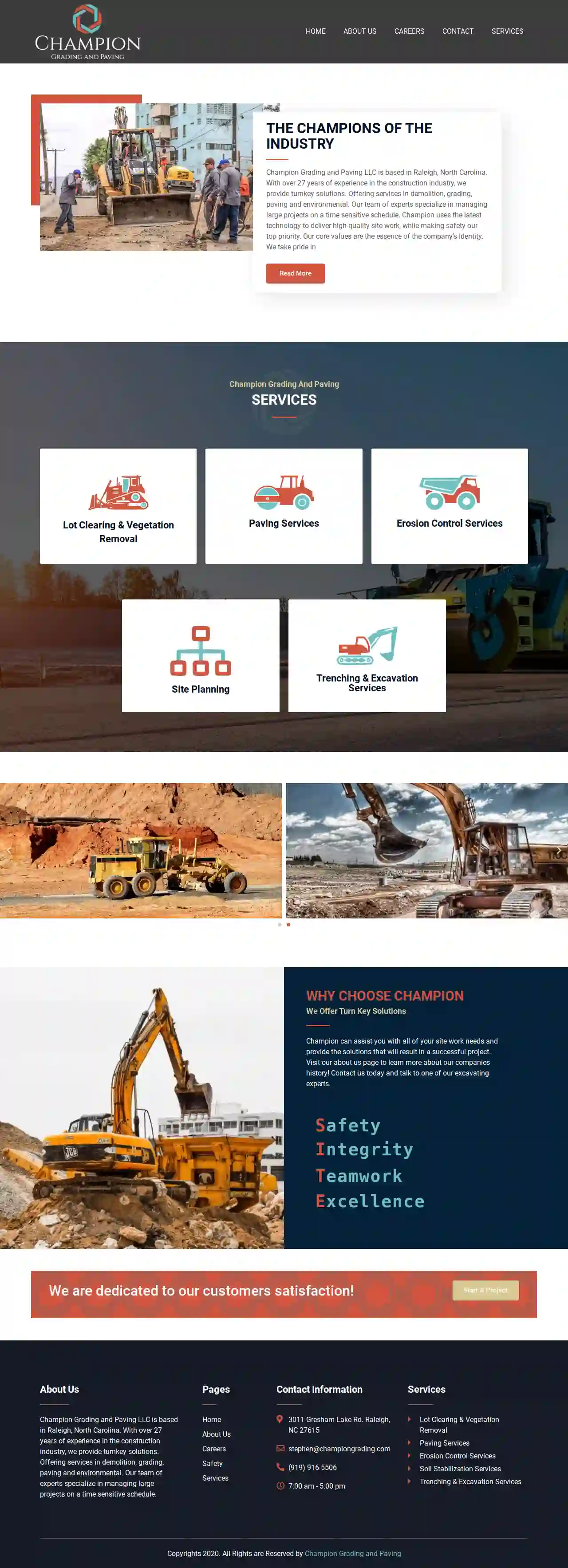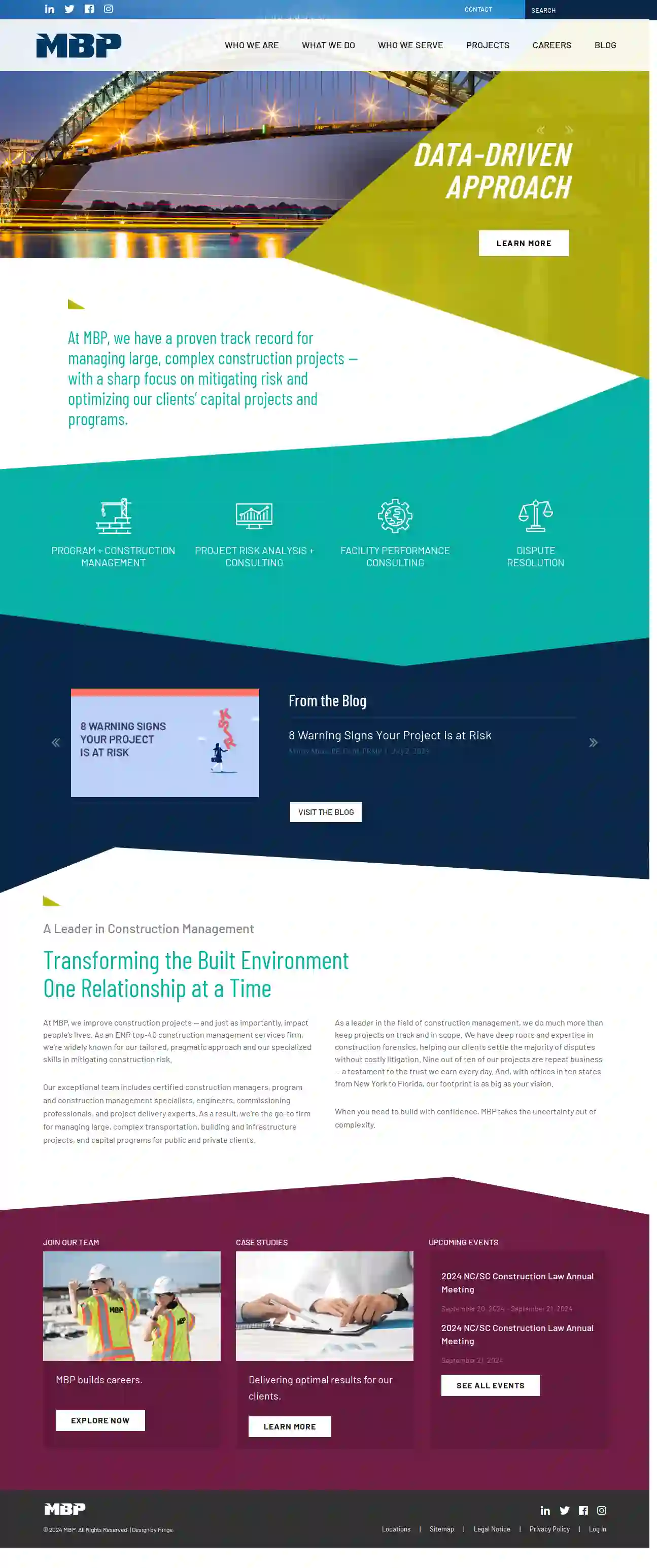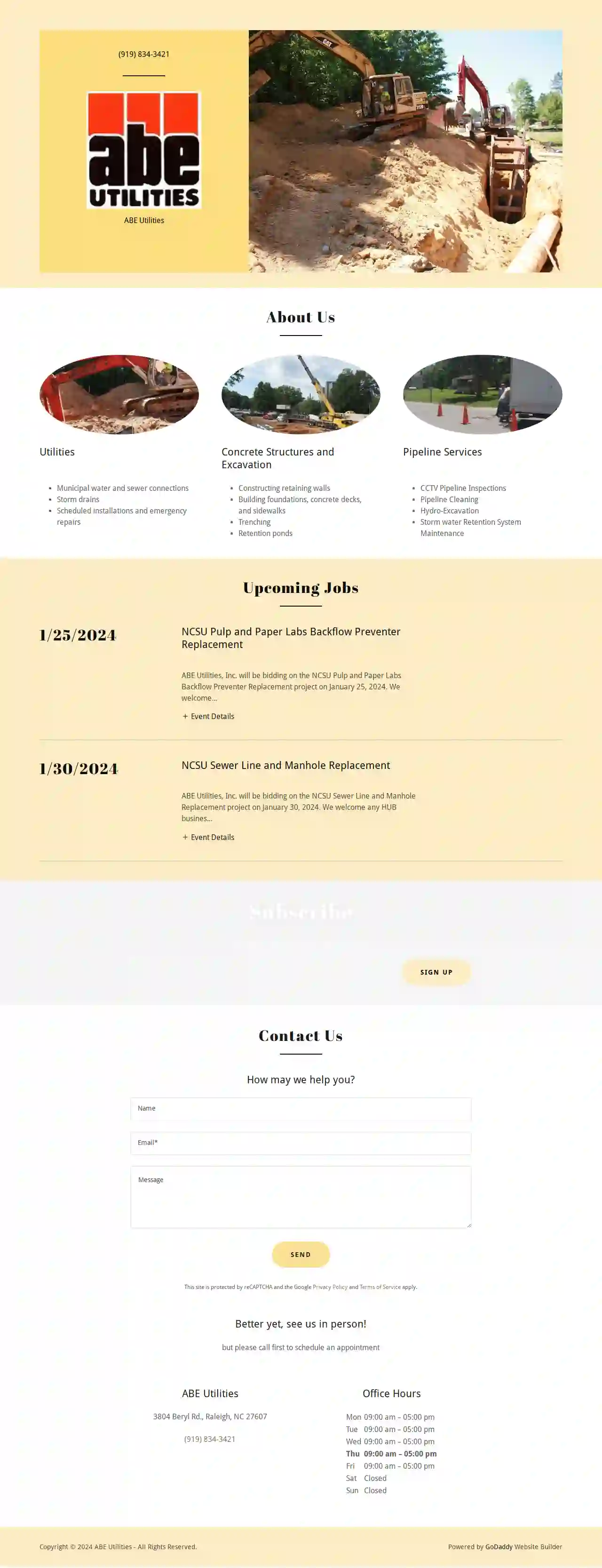Dirt Contractors Raleigh
Find top Dirt Contractor in Raleigh
Receive up to 3 Dirt Hauling quotes for your project today! Compare profiles, reviews, accreditations, portfolio, etc... and choose the best service.

BAF Contracting Inc
41 reviews123 Main Street, City, 12345, USBAF Contracting: Your Trusted Partner for Construction Projects BAF Contracting is a reputable and experienced construction company serving the [CITY] area. We are dedicated to providing high-quality construction services for both residential and commercial projects. Our team of skilled professionals is committed to delivering exceptional results that meet your specific needs and exceed your expectations. With years of experience in the industry, we have built a strong reputation for reliability, professionalism, and attention to detail. We understand the importance of clear communication, timely completion, and staying within budget. Our goal is to make your construction project a smooth and stress-free experience.
- Services
- Why Us?
- Testimonials
Get Quote
Twisted Arc LLC
53 reviews123 Main Street, Anytown, 12345, USAbout Twisted Arc LLC Twisted Arc LLC is a full-service electrical contractor serving the greater [CITY] area. We are committed to providing our clients with the highest quality workmanship and customer service. We specialize in a wide range of electrical services, including: Residential electrical services Commercial electrical services Industrial electrical services Troubleshooting and repair New construction Remodeling And more! Our team of experienced electricians is dedicated to providing our clients with the best possible experience. We are licensed, bonded, and insured, and we offer a 100% satisfaction guarantee on all of our work. Contact us today for a free estimate!
- Services
- Why Us?
Get Quote
Kenneth West Inc
45 reviews800 Bricksteel Lane, Garner, 27529, USAbout Us Kenneth West, Inc. is a privately owned site construction company headquartered in Apex, NC. We have been serving the residential and commercial construction industry here in the Triangle continuously since we first opened our doors in 1972. We are an unlimited licensed highway / public utility contractor. We are fully insured and bonded, and are GPS ready. Kenneth West, Inc. specializes in clearing and grubbing, erosion control, mass grading, curb and gutter, underground utility construction, and pavement construction, in and around the Triangle area of North Carolina. Advantages of KWI At KWI, we understand that the success of our company first depends on the success of our customers. It’s for that reason that we never waiver from the following company guidelines: Listen to the customer. Seek to understand their expectations of each project and work together to make them our own. Be committed to professionalism and provide excellent customer service throughout the life of the project. Always maintain an emphasis on quality of workmanship. In business (as in life) when given a choice, always do the right thing.
- Services
- Why Us?
- Testimonials
- Gallery
Get Quote
Raleigh Waterproofing Inc
4.830 reviewsRaleigh, USWelcome To Raleigh Waterproofing Raleigh Waterproofing Inc. was established in May 2001 by David Hawkins II to provide quality service, expert support and knowledge to everyone. There is nothing more important than the customer’s complete satisfaction! We excel in both residential and commercial waterproofing and repairs. We have built our reputation on honest advice, quality service and continued customer support. Our motto has always been, “You haven’t seen expensive until you hire an amateur”. WHO WE ARE We provide you with services you need at prices you can afford. You deserve the best waterproofing services, and Raleigh Waterproofing is dedicated to providing you those services! OUR MISSION To treat each project as special, and worthy of our best work. We will assist you with each phase of your project in a professional and courteous manner. OUR VISION To become the benchmark for quality new construction and commercial waterproofing work. Through continuous improvements in integrity, teamwork, and creativity of our people.
- Services
- Why Us?
- Gallery
Get Quote
Champion Grading and Paving LLC
53 reviews3011 Gresham Lake Rd., Raleigh, 27615, USChampion Grading and Paving LLC Champion Grading and Paving LLC is based in Raleigh, North Carolina. With over 27 years of experience in the construction industry, we provide turnkey solutions. Offering services in demolition, grading, paving and environmental. Our team of experts specialize in managing large projects on a time sensitive schedule. Champion uses the latest technology to deliver high-quality site work, while making safety our top priority. Our core values are the essence of the company’s identity. We take pride in our commitment to customer satisfaction and delivering projects on time and within budget. Champion can assist you with all of your site work needs and provide the solutions that will result in a successful project. Visit our about us page to learn more about our companies history! Contact us today and talk to one of our excavating experts.
- Services
- Why Us?
- Gallery
Get Quote
MBP
51 reviewsRaleigh, USThe Most Trusted Voice on Your Project Learn More Better Project Outcomes Learn More We Take the Uncertainty Out of Complexity Learn More Data-Driven Approach Learn More At MBP, we have a proven track record for managing large, complex construction projects — with a sharp focus on mitigating risk and optimizing our clients’ capital projects and programs. As a leader in the field of construction management, we do much more than keep projects on track and in scope. We have deep roots and expertise in construction forensics, helping our clients settle the majority of disputes without costly litigation. Nine out of ten of our projects are repeat business — a testament to the trust we earn every day. And, with offices in ten states from New York to Florida, our footprint is as big as your vision. When you need to build with confidence, MBP takes the uncertainty out of complexity.
- Services
- Why Us?
- Gallery
Get Quote
Metcon Construction Inc
52 reviewsRaleigh, NC, USMetcon provides a full range of General Contracting services for both public and private clients. We deliver innovative and sustainable buildings that shape how people learn, live, and experience our communities. Our Mission To successfully deliver projects that positively impact our clients, the environment, our employees, and the communities in which we live and work. Core Values Safety On Time Delivery Diversity and inclusion Environmental sustainability Client satisfaction Quality Innovation and technology
- Services
- Why Us?
- Gallery
Get Quote- Ne
NextGen Logging & Clearing LLC
51 reviewsRaleigh, USWe are a local business dedicated to providing high-quality services to our community. Our team is committed to exceeding your expectations and delivering exceptional results. We are passionate about what we do and strive to build lasting relationships with our clients. Contact us today to learn more about how we can help you achieve your goals.
- Services
- Why Us?
- Gallery
Get Quote 
ABE Utilities Inc
3.98 reviewsRaleigh, US- Services
- Why Us?
Get Quote
DIRT R US, INC.
2.522 reviewsRaleigh, US- Services
- Why Us?
Get Quote
Over 3,943+ Excavation Businesses registered
Our excavation experts operate in Raleigh & surrounding areas!
ExcavationHQ has curated and vetted the Best Excavation Companies near Raleigh. Find a top & trustworthy business today.
Frequently Asked Questions About Dirt Contractors
- Dirt Type: Clay soils tend to settle slower than sandy soils due to their smaller particle size and higher water retention.
- Compaction: Proper compaction helps accelerate the settling process by reducing air pockets and increasing soil density.
- Moisture Content: Excessive moisture can prolong settling time, as the water needs to evaporate or drain away.
- Weather Conditions: Warm, dry weather promotes faster settling compared to cold or wet conditions.
- Increases Soil Stability: Compacted soil is less likely to shift, settle, or erode, providing a stable foundation for structures, walkways, or driveways.
- Improves Drainage: Compaction can enhance drainage by reducing the soil's porosity and allowing water to flow more efficiently.
- Reduces Settlement: Proper compaction minimizes future settling, preventing uneven surfaces or structural damage.
- Enhances Load-Bearing Capacity: Compacted soil can support heavier loads without excessive compression or deformation.
- Environmental Site Assessment: Hire a qualified environmental consultant to conduct a Phase I Environmental Site Assessment (ESA). This involves reviewing historical records, conducting site reconnaissance, and interviewing relevant parties to identify potential environmental concerns.
- Soil Sampling and Testing: If the ESA indicates potential contamination, soil samples will be collected and analyzed in a laboratory for the presence of specific contaminants, such as heavy metals, pesticides, or petroleum products.
- Clear the Area: Remove any obstacles, such as furniture, toys, or landscaping features, from the designated delivery zone.
- Mark Utilities: Contact your local utility companies to have underground utilities, such as water lines, gas lines, or electrical cables, marked to prevent accidental damage during delivery.
- Protect Existing Landscaping: Cover or move any valuable plants, shrubs, or trees that might be affected by the dirt delivery.
- Provide Access: Ensure the delivery truck has clear access to the delivery zone, including wide enough gates or driveways.
- Communicate with the Contractor: Discuss any specific instructions or concerns you have with the dirt contractor before delivery day.
How long does it take for dirt to settle after delivery?
What is dirt compaction, and why is it important?
How do I know if the dirt I need is contaminated?
How do I prepare my yard for dirt delivery?
How long does it take for dirt to settle after delivery?
- Dirt Type: Clay soils tend to settle slower than sandy soils due to their smaller particle size and higher water retention.
- Compaction: Proper compaction helps accelerate the settling process by reducing air pockets and increasing soil density.
- Moisture Content: Excessive moisture can prolong settling time, as the water needs to evaporate or drain away.
- Weather Conditions: Warm, dry weather promotes faster settling compared to cold or wet conditions.
What is dirt compaction, and why is it important?
- Increases Soil Stability: Compacted soil is less likely to shift, settle, or erode, providing a stable foundation for structures, walkways, or driveways.
- Improves Drainage: Compaction can enhance drainage by reducing the soil's porosity and allowing water to flow more efficiently.
- Reduces Settlement: Proper compaction minimizes future settling, preventing uneven surfaces or structural damage.
- Enhances Load-Bearing Capacity: Compacted soil can support heavier loads without excessive compression or deformation.
How do I know if the dirt I need is contaminated?
- Environmental Site Assessment: Hire a qualified environmental consultant to conduct a Phase I Environmental Site Assessment (ESA). This involves reviewing historical records, conducting site reconnaissance, and interviewing relevant parties to identify potential environmental concerns.
- Soil Sampling and Testing: If the ESA indicates potential contamination, soil samples will be collected and analyzed in a laboratory for the presence of specific contaminants, such as heavy metals, pesticides, or petroleum products.
How do I prepare my yard for dirt delivery?
- Clear the Area: Remove any obstacles, such as furniture, toys, or landscaping features, from the designated delivery zone.
- Mark Utilities: Contact your local utility companies to have underground utilities, such as water lines, gas lines, or electrical cables, marked to prevent accidental damage during delivery.
- Protect Existing Landscaping: Cover or move any valuable plants, shrubs, or trees that might be affected by the dirt delivery.
- Provide Access: Ensure the delivery truck has clear access to the delivery zone, including wide enough gates or driveways.
- Communicate with the Contractor: Discuss any specific instructions or concerns you have with the dirt contractor before delivery day.